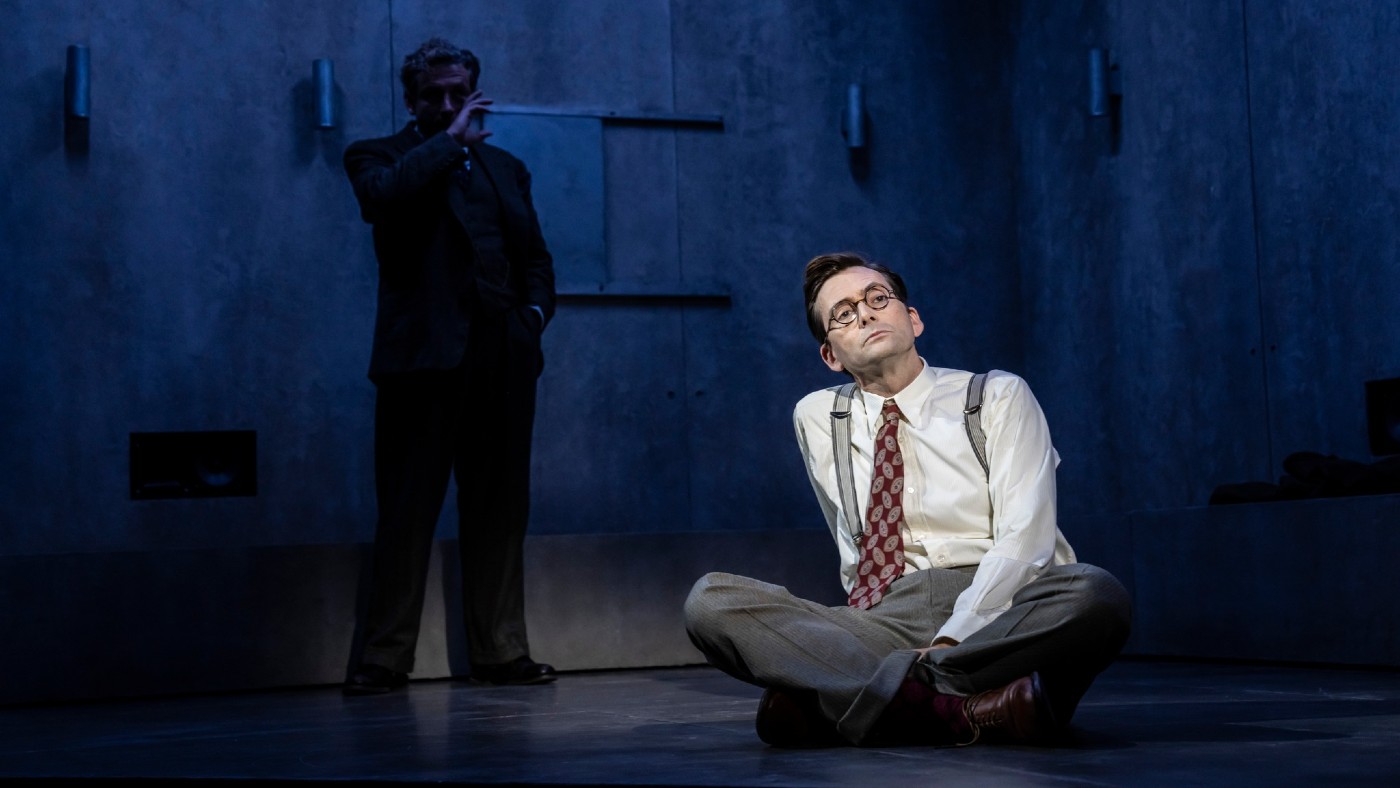Good review: ‘fascinating psychological theatre’ starring David Tennant
This quietly terrifying play offers a ‘surprising and perceptive psychological slant’ on the Nazis’ rise

A free daily email with the biggest news stories of the day – and the best features from TheWeek.com
You are now subscribed
Your newsletter sign-up was successful
“Few actors can project charismatic affability better than David Tennant,” said Dominic Cavendish in The Daily Telegraph. And fewer still have his ability to switch off the charm in an instant and “go dead behind the eyes”, as we discovered when he played the serial killer Dennis Nielsen in ITV’s Des.
In Good, set in pre-war Germany, Tennant plays another “seemingly ordinary man” – a liberal-minded literature professor, John Halder, who gradually becomes part of the Nazi “killing machine”, washes his hands of his Jewish best friend, and ends up arguing for the Final Solution.
First performed in 1981, C.P. Taylor’s quietly terrifying play offers a “surprising and perceptive psychological slant” on the Nazis’ rise. Halder is not “spurred by rousing speeches” and nationalist passion – but rather by bourgeois insularity, “self-interest and self-absorption”. And Tennant’s performance is “hypnotic”.
The Week
Escape your echo chamber. Get the facts behind the news, plus analysis from multiple perspectives.

Sign up for The Week's Free Newsletters
From our morning news briefing to a weekly Good News Newsletter, get the best of The Week delivered directly to your inbox.
From our morning news briefing to a weekly Good News Newsletter, get the best of The Week delivered directly to your inbox.
This is “fascinating psychological theatre with the feel of a fever dream”, amplified in Dominic Cooke’s production by bold, non-naturalistic staging, said Arifa Akbar in The Guardian. Vicki Mortimer’s set is “grey and prison-like”; scenes change abruptly. The strangeness of all this is explained by a reveal at the end, but “the payoff isn’t quite surprising enough”. Still, there is “enough intrigue, intellect and fine acting to keep us rapt”, and Tennant is “spellbinding in his ordinariness, not hiding Halder’s venality yet ensuring he remains human”.
Tennant’s is a “chilling performance rather than a moving one”, said Sarah Crompton on What’s on Stage. It falls to Elliott Levey, as Maurice, Halder’s best friend, to locate the play’s emotion, and he brilliantly conveys both Maurice’s humour and rising panic.
Sharon Small is equally persuasive, said Dominic Maxwell in The Times: she has to switch between parts – Halder’s wives, his mother, a Nazi soldier – and does so in a way that is “clear, unfussy, instant”. Don’t expect fireworks from this excellent revival. “What you get is something stranger, more insidious, and I suspect much more memorable.”
Harold Pinter Theatre, London SW1
A free daily email with the biggest news stories of the day – and the best features from TheWeek.com
-
 The environmental cost of GLP-1s
The environmental cost of GLP-1sThe explainer Producing the drugs is a dirty process
-
 Nuuk becomes ground zero for Greenland’s diplomatic straits
Nuuk becomes ground zero for Greenland’s diplomatic straitsIN THE SPOTLIGHT A flurry of new consular activity in the remote Danish protectorate shows how important Greenland has become to Europeans’ anxiety about American imperialism
-
 ‘This is something that happens all too often’
‘This is something that happens all too often’Instant Opinion Opinion, comment and editorials of the day
-
 Arcadia: Tom Stoppard’s ‘masterpiece’ makes a ‘triumphant’ return
Arcadia: Tom Stoppard’s ‘masterpiece’ makes a ‘triumphant’ returnThe Week Recommends Carrie Cracknell’s revival at the Old Vic ‘grips like a thriller’
-
 My Father’s Shadow: a ‘magically nimble’ love letter to Lagos
My Father’s Shadow: a ‘magically nimble’ love letter to LagosThe Week Recommends Akinola Davies Jr’s touching and ‘tender’ tale of two brothers in 1990s Nigeria
-
 Send Help: Sam Raimi’s ‘compelling’ plane-crash survival thriller
Send Help: Sam Raimi’s ‘compelling’ plane-crash survival thrillerThe Week Recommends Rachel McAdams stars as an office worker who gets stranded on a desert island with her boss
-
 Book reviews: ‘Hated by All the Right People: Tucker Carlson and the Unraveling of the Conservative Mind’ and ‘Football’
Book reviews: ‘Hated by All the Right People: Tucker Carlson and the Unraveling of the Conservative Mind’ and ‘Football’Feature A right-wing pundit’s transformations and a closer look at one of America’s favorite sports
-
 Catherine O'Hara: The madcap actress who sparkled on ‘SCTV’ and ‘Schitt’s Creek’
Catherine O'Hara: The madcap actress who sparkled on ‘SCTV’ and ‘Schitt’s Creek’Feature O'Hara cracked up audiences for more than 50 years
-
 6 gorgeous homes in warm climes
6 gorgeous homes in warm climesFeature Featuring a Spanish Revival in Tucson and Richard Neutra-designed modernist home in Los Angeles
-
 Touring the vineyards of southern Bolivia
Touring the vineyards of southern BoliviaThe Week Recommends Strongly reminiscent of Andalusia, these vineyards cut deep into the country’s southwest
-
 Nan Goldin: The Ballad of Sexual Dependency – an ‘engrossing’ exhibition
Nan Goldin: The Ballad of Sexual Dependency – an ‘engrossing’ exhibitionThe Week Recommends All 126 images from the American photographer’s ‘influential’ photobook have come to the UK for the first time